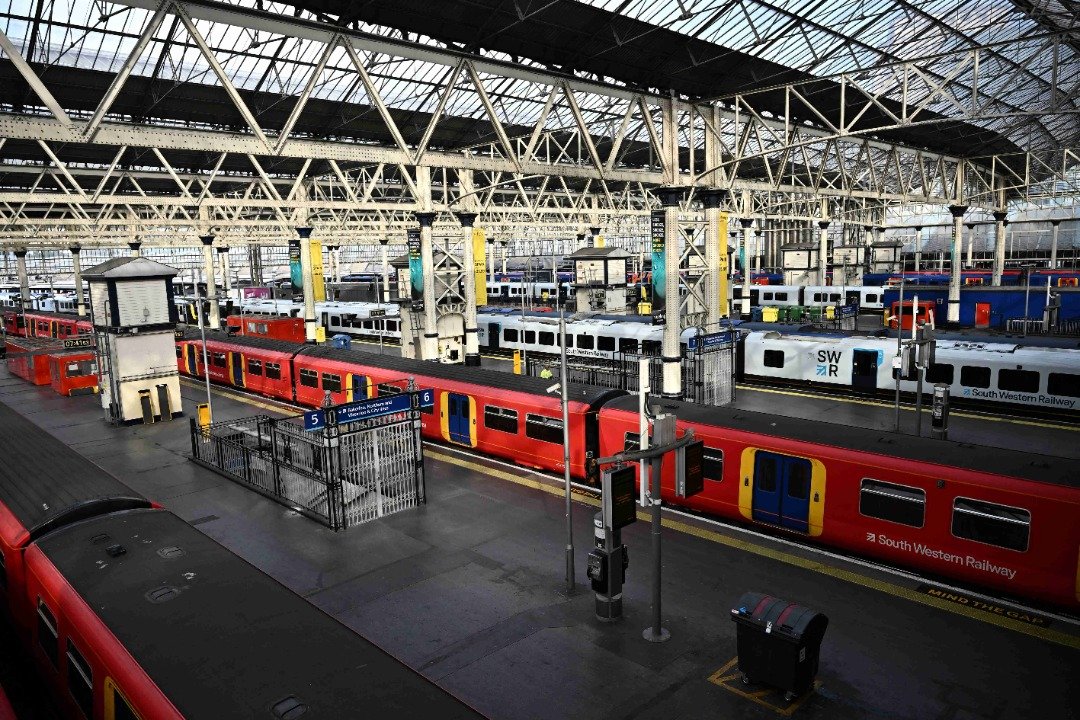
Sources revealed that the walk out, which began following a deadlock meeting with the RMT workers on Monday, threatened a wider spread of industrial action.
The strike, scheduled for Tuesday, Thursday, and Saturday, risks causing significant disruption to major events including the Glastonbury music festival. Jobs are also at risk, with passenger traffic yet to fully recover after the lifting of coronavirus pandemic lockdowns.
Rush-hour commuters in the UK had already faced chaos on Tuesday as railway workers launched the network’s biggest strike in more than three decades, forcing people to trek to work on foot, by bike, bus, or simply not bother at all.
The RMT says the strike is necessary as wages have failed to keep pace with the UK inflation, which has hit a 40-year high and is on course to keep rising.
Train and London Underground stations, normally a sea of people for the morning rush, were deserted or even locked, with just a skeleton service running on many networks across the country.
Passengers were warned not to travel all week, with two more days of strike action scheduled for Thursday and Saturday, capable of wreaking havoc on schedules.
In London, cab firms reported a surge in demand, while main roads were packed with buses and cars, and cyclists weaving in between.
Long queues formed at bus stops on the outskirts of London shortly after 6:00 am, but many gave up as services carried on without stopping, already full.
At St Albans, a commuter town north of the capital, a local newsagent next to the station said, “It’s been quiet. People are working from home.”
Scott, a 43-year-old bank worker who did not want to give his full name, was among the few commuters on the nearly deserted platform.
He said his commute on the 8:30 am train would be extended by about 25 minutes as he would have to walk from St. Pancras station to his office.
But he said there were silver linings to the strike, which he supported, saying “I stand a better chance of getting a seat and it not being crazy.”
Transport Secretary Grant Shapps said he “deplored” the strikes, which he said evoked the “bad old days of the 1970s.”
“The people that are hurting are people who physically need to turn up for work, maybe on lower pay, perhaps the cleaners in hospitals,” he told <em>Sky News</em>.
“I absolutely deplore what they’re doing today and there is no excuse for taking people out on strike.”
Prime Minister Boris Johnson, addressing his cabinet, urged “the union barons to sit down with Network Rail and the train companies” to thrash out a deal.
The country needed to “stay the course”, defending reforms to the rail network as needed and in the public interest.
The RMT general-secretary Mick Lynch has described as “unacceptable” offers of below-inflation pay rises by both overground train operators and London Underground which runs the Tube in the capital.
Schools are equally warning that thousands of teenagers taking national exams will also be affected.
The strikes are the biggest dispute on Britain’s railway network since 1989, according to the RMT.
Rail operators, however, warned of disruption throughout the week.
Only about 20 per cent of services were running during the walkouts while lines not affected by strike action are still having to reduce services.
The RMT members on the London Underground were additionally staging a 24-hour Tube train stoppage Tuesday.
On Tuesday, long traffics were sighted on the highways as the usual train commuters opted for the road to head somewhere.
It was already gathered that before the UK rail strike, Brussels Airport in Germany had cancelled all outbound flights on Monday after most security staff joined a nationwide strike for better pay as soaring inflation hit workers’ purchasing power.
The stoppage kicked off a week of travel chaos in several parts of Europe, which include the massive rail strike in Britain from Tuesday and, later on, strikes hitting the continent’s biggest airline Ryanair in multiple countries.
Apparently, not only the UK economy is threatened, but also, the European economy at large as inflation rates bite hard post COVID-19 in several countries.
AFP





